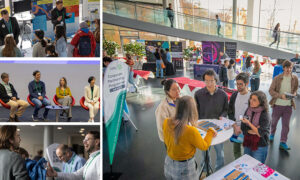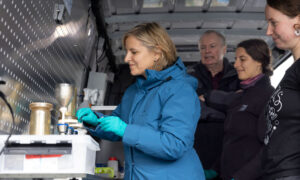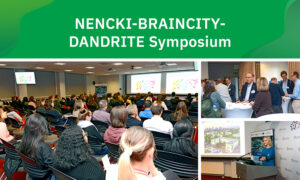
TREC in Italy – sampling from coast to coast
For almost two months, Italy was the stage for the TREC expedition, with a rich programme of events organised across the country attended by the public, scientists, schools, and high-level political stakeholders, including Minister of University and Research Anna Maria Bernini
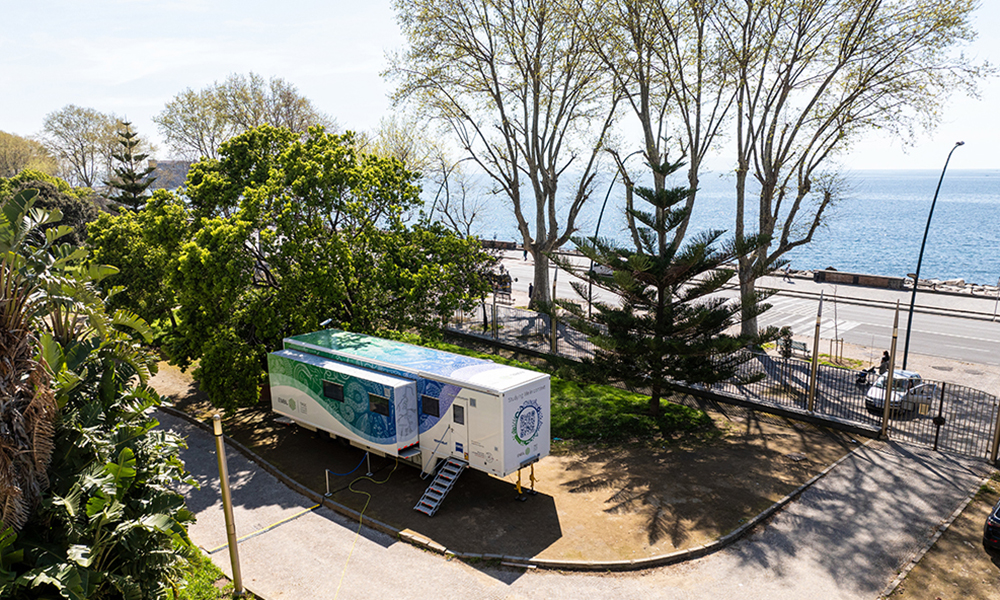
After travelling through 17 European countries, the TREC expedition reached Italy in April 2024 to study the coastal ecosystems along the peninsula in collaboration with local partners. Besides Italy being an EMBL founding member state and a host country, there is a long history of collaboration between EMBL and several Italian research institutions.
Overall, the expedition made five stops in Italy – including a ‘superstop’ in Naples – hosted by collaborators from two of the leading national research centres: the National Research Council (CNR) and the Stazione Zoologica Anton Dohrn (SZN). Their role in the expedition was to work together with the TREC scientists, jointly coordinating the fieldwork and providing their expertise in marine biology, as well as their knowledge of local biodiversity and relevant sampling sites along the coast. Local partners were also key in the organisation of scientific and stakeholders’ events at each stop and were often involved in outreach and public engagement activities.
The first stop in Pisa was hosted by the Institute of Biophysics of the CNR (CNR-IBF), where the Tara schooner and the land sampling team arrived on 15 April, welcomed by the CNR President Maria Chiara Carrozza. The expedition sampled on Italian land and sea along the Tyrrhenian coast in Tuscany and Lazio before reaching Naples – the Italian super-stop hosted by SZN. There, the EMBL Advanced Mobile Laboratory and its team of experts had already been stationed since the beginning of April, supporting the TREC expedition and providing scientific services to the local scientists.
A major component of the EMBL Mobile Services, the Advanced Mobile Laboratory is a sophisticated laboratory on wheels. It includes cutting-edge light microscopy, sample preparation for (cryo)-electron microscopy, and single-cell pheno-genomics. Additionally, advanced tools for environmental measurements from soil, air, sediment, and water samples are part of the standard equipment. Such advanced instruments and technologies are being deployed during the expedition to paint a comprehensive picture of our coastal ecosystems, enabling European scientists to leverage solutions to current challenges with a vision of science without frontiers.
“It was a great opportunity to have the instrumentation and technical support in close proximity to my research institute,” said Rossella Annunziata, a researcher at the SZN. “I was able to prepare the samples in my laboratory and perform the analysis in the Advanced Mobile Laboratory, which was only a few minutes away. This allowed me to carry out delicate experiments, avoiding waiting times that could impair their success. The preliminary data I have obtained will allow me to write a grant proposal for a new and challenging project in my laboratory.”
The TREC expedition brought together scientists, the EMBL mobile labs, the Tara Schooner, and local partners in Naples, forming a unique scientific fleet dedicated to addressing some of the most pressing environmental challenges of our time.
Marking the arrivals sampling teams and the Tara schooner in Naples, the TREC partners organised a welcome ceremony at the Molosiglio Navy Military Base and the Stazione Zoologica on 5 May 2024. Among the guests were decision-makers, scientific representatives from Italy, France, and the European Commission, as well as politicians, including the Italian Minister of Research and University Anna Maria Bernini.
Among the speakers were the Captain of the Naples Navy Military Base and the Mayor of Naples, who welcomed the expedition to the city. EMBL Director General Edith Heard, Tara Ocean Foundation Executive Director Romain Trouble, and EMBRC Executive Director Nicolas Pade addressed the audience with words about the TREC expedition, its journey to date, and its future impact and benefit.

(bottom-left to right): Tara Ocean Foundation Executive Director Romain Trouble, EMBL Director General Edith Heard, EMBRC Executive Director Nicolas Pade. Credits: EMBL Photolab
Congratulating the participating organisations for bringing to life this ambitious pan-European project involving more than 150 research groups from 30 European countries working across a range of disciplines, Minister Bernini said: “TREC is a unique and powerful example of international cooperation. The Italian Ministry of University and Research is strongly committed to promoting research related to the study and protection of coastal and marine ecosystems.”
Commenting on EMBL’s research and its site in Italy, Bernini added: “EMBL is synonymous with excellence. As one of EMBL’s founding members, Italy strongly believes in its value as a leading international research organisation. I look forward to inaugurating the revamped Italian site of EMBL in Rome after the renovation works.”
The guests, accompanied by Roberto Bassi, President of SZN, visited the scientific schooner Tara – docked at the Italian Navy Molosiglio Base – and the EMBL Advanced Mobile Laboratory, in the Villa Comunale.

The connection between SZN and the project has deep roots. In addition to being the lead partner of the European Marine Biological Resource Centre (EMBRC) in Italy, SZN first hosted the Tara schooner in 2014, and the collaborations between SZN and EMBL researchers are multiple and long-standing. In 2019, SZN hosted at its laboratories in Ischia the first pilot expedition that laid the scientific and methodological foundations for the TREC expedition.
In addition to the institutional event on 5 May, several other events were organised around the TREC super-stop in Naples. From 9–12 April 2024, SZN and TREC scientists joined forces to organise the EMBO lecture course ‘Imaging marine organisms across scales’, supported by technologies hosted by the EMBL Advanced Mobile Laboratory. The course brought together marine and cell biologists with microscopists at different stages of their career to study marine organisms at different scales using multimodal imaging.
On 6 May 2024, scientists from the SZN, the TREC expedition and other partner institutes gathered for a scientific symposium at the Stazione Zoologica to discuss the scientific context of the expedition. Elisabetta Balzi, Head of Unit ‘Ocean, Seas and Waters’ at the EU, introduced the first session by describing the EU Ocean Mission. She was followed by TREC Scientific Director Peer Bork and Head of EMBL Scientific Expeditions Paola Bertucci, who presented the TREC expedition, with references to the various collaborations with the EU and highlighted TREC’s support for the Ocean Mission.
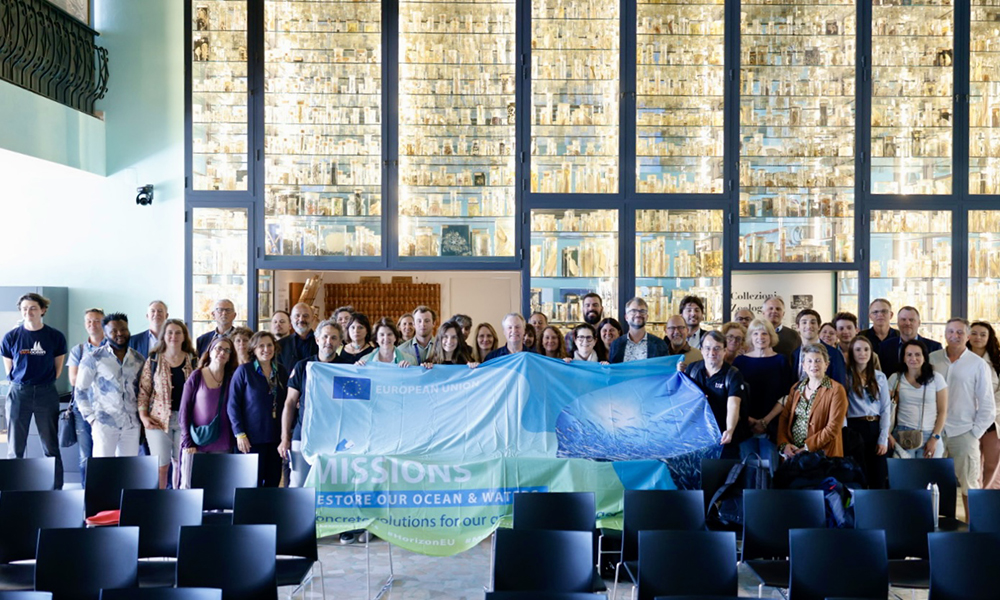
Finally, a range of public engagement activities – games, guided tours, exhibitions and workshops – were offered at various locations around Naples during the expedition’s stay. Some of these activities were carried out with the support of the TREC-related EU project BIOcean5D and the National Biodiversity Future Centre (NBFC). NBFC is one of the five national centres dedicated to frontier research funded by the Italian National Plan for Recovery and Resilience (PNRR), coordinated by the CNR and involving scientific institutions and enterprises throughout Italy engaged in conserving, restoring, monitoring, and enhancing Italian and Mediterranean biodiversity.
After Naples, the sampling teams moved south to the Calabrian coast to make a base in Amendolara, where they received support from the local Research Centre and Advanced Marine Infrastructures (CRIMAC) of the SZN. Scientists at the SZN-CRIMAC actively participated in the sampling activities, and on 16 May, they organised the event ‘TREC meets CRIMAC: a meeting for the knowledge and protection of the territory’. The event was attended by local scientists and institutional stakeholders, including the SZN President Roberto Bassi, who emphasised the importance of international collaboration to address global challenges, such as the health of marine ecosystems.
As it moved to the Adriatic coast, the expedition received support from the CNR Institute for Biological Resources and Marine Biotechnology (CNR-IRBIM) for stops in Lesina and Ancona. Gian Marco Luna – Director of the CNR-IRBIM and coordinator of one of the two research areas of the National Biodiversity Future Center – participated in the TREC stops in Pisa and Naples and hosted the Ancona stop. Here, TREC scientists were welcomed in a celebratory event, which further highlighted affinities and connections between TREC and the NBFC in the presence of local stakeholders. Participants had the opportunity to learn about the expedition, visit the mobile laboratories, and discover the procedures and equipment used by the land sampling team.
“50 years into EMBL’s establishment, we are delighted to celebrate with our founding member state Italy the remarkable achievements and collaborations forged through the TREC expedition,” said EMBL Director General Edith Heard. “We look forward to further strengthening synergies with Italy and working together in our shared commitment to promote science and safeguard our planet for future generations. I would also like to express my heartfelt thanks to the TREC team and our Italian partners who worked so hard to make this expedition happen.”
